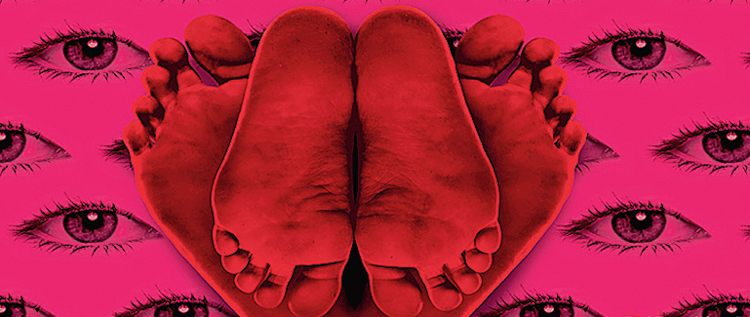2010: Love Sex Aur Dhokha
Director: Dibakar Banerjee
“It’s going to change the way we react to films,” was director Dibakar Banerjee’s promise to The Telegraph in March 2010, in the run-up to the release of Love Sex Aur Dhokha. LSD, as it is popularly known, was a cinematic high, combining a three-shorts-in-one template that reformatted the idiom of storytelling and was largely presented in the form of grainy footage shot predominantly on spy cam and handy cam, something that we hadn’t seen a Bolly film attempt before.
The film may not have really broken ground in terms of story, but it did herald a first of sorts for Bollywood, filming the stories in an unstructured, spontaneous and sporadic manner with the camera being incidental. It ably married content to form, binding the three stories together and yet keeping them disparate.
It also gave us many moods and moments — the honour-killing scene in the first short, with the camera heaving back and forth, still gives us goosebumps — that stay on. More importantly, it marked the debut of Rajkummar Rao (then Yadav) and also had Nushrat Bharucha — who has spotlighted herself into big Bolly with Sonu Ke Titu Ki Sweety and Dream Girl — in one of the shorts.

A scene from the movie Source: ‘Udaan’
2010: Udaan
Director: Vikramaditya Motwane
Wounded relationships, a lifetime of parental abuse and quiet rebellion were at the core of Vikramaditya Motwane’s powerful and poignant debut film. On the surface, Udaan — that the filmmaker co-wrote with long-time collaborator Anurag Kashyap — was a tale of the dreams of a repressed adolescent, but it packed in much more.
Working from a script written in 2003 which found its audience only seven years later, Motwane combined quiet understatedness with seething anger to weave the tale of young Rohan (few debutants later have managed to match the angst and agony in Rajat Barmecha’s eyes) who faces abuse, both physical and mental, at the hands of his dad (an excellent Ronit Roy in a role that spawned many such similar parts, a few of which the actor himself played) and the way he uses his writing and his imagination as a weapon of dissent.
Udaan was many films in one — a father-son story, a coming-of-age film, a cautionary tale — winning over audiences from Calcutta to Cannes. Some scenes, like Rohan out-racing his dad and then walking out of his home, hand in hand, with his younger brother to start a new life in the final moments of the film, are etched for posterity. The film gave us a new voice in Motwane as well as a re-look at abuse and exploitation in a parent-child relationship.
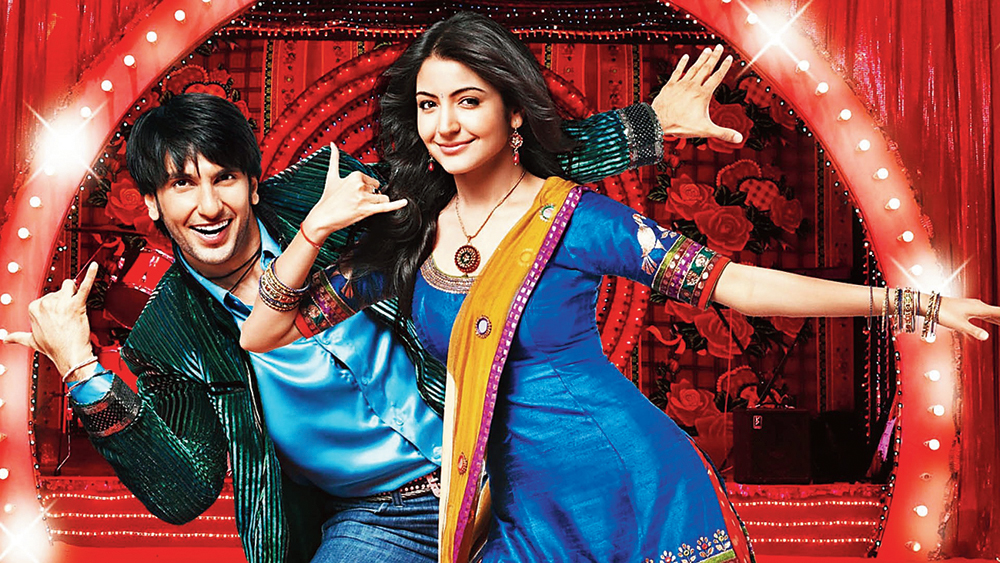
A scene from the movie Source: ‘Band Baaja Baaraat’
2010: Band Baaja Baaraat
Director: Maneesh Sharma
Delhi, the colourful bylanes of Janakpuri to the white edifices of Connaught Place, came alive in this fun film built on the foundation of the booming wedding planning business that marked the debut of Ranveer Singh.
Band Baaja Baaraat was like the typical Indian wedding — boisterous, feel-good, chaotic in a cool way and a whole lot of fun, with Anushka Sharma’s sparkling and spunky act as Shruti lighting up the screen. The film, however, belonged to Ranveer’s Bittoo who was rewarded with the best lines — “Tere bina kisi cheez mein mauj nahin... na ladkiyan taadne mein, na chai mein, na chowmein mein” being the pick of the lot. Sharp writing was its backbone and charm defined this slice-of-life watch that gave rise to many other similarly themed films thereafter, but none could match the magic of Band Baaja Baaraat. Bread pakode ki kasam!
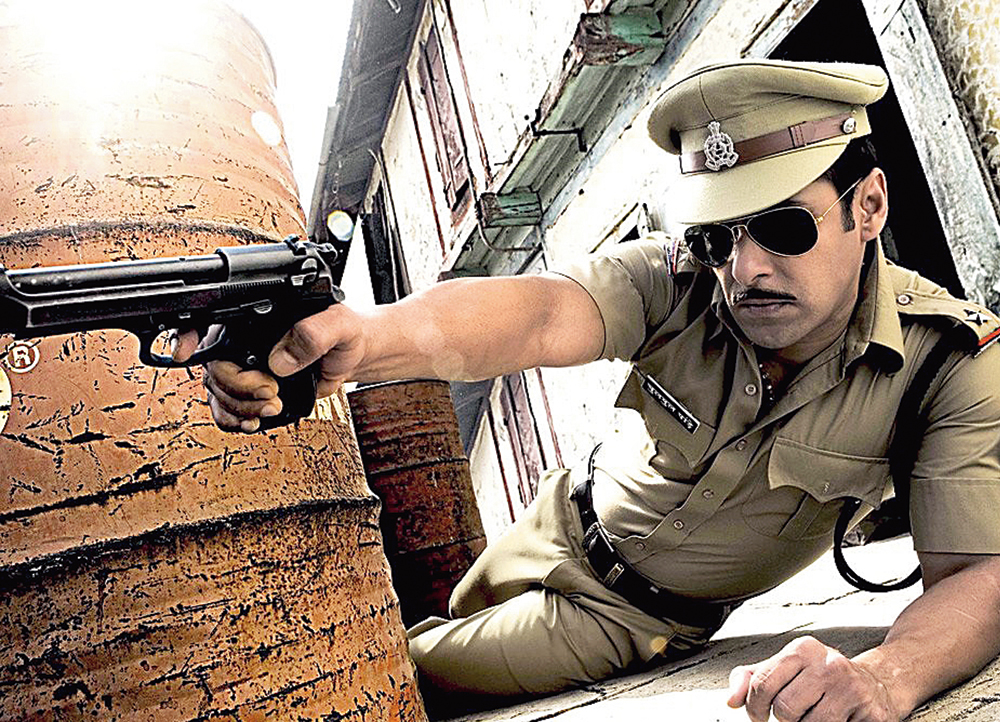
A scene from the movie Source: ‘Dabangg’
Special mention: Dabangg
Salman Khan slapped on a moustache and perched his Ray-Bans on the back of his collar to give us the irreverent and cheerfully corrupt cop Chulbul Pandey in a desi spaghetti Western that spun an all-new twist to the average Bolly masala movie. Armed with an arsenal of killer one-liners, cheeky jokes, Rajinikanth-inspired mannerisms and Hulk-like strength, Chulbul became cult in no time, perhaps the most crackling character seen on the Bolly screen in the last few decades. Salman embraced the character like no other — playing it in two more films after this — strutting and swaggering and even sometimes spoofing himself. Dabangg, directed by Abhinav Singh Kashyap, is masala done right and no one’s come close since.
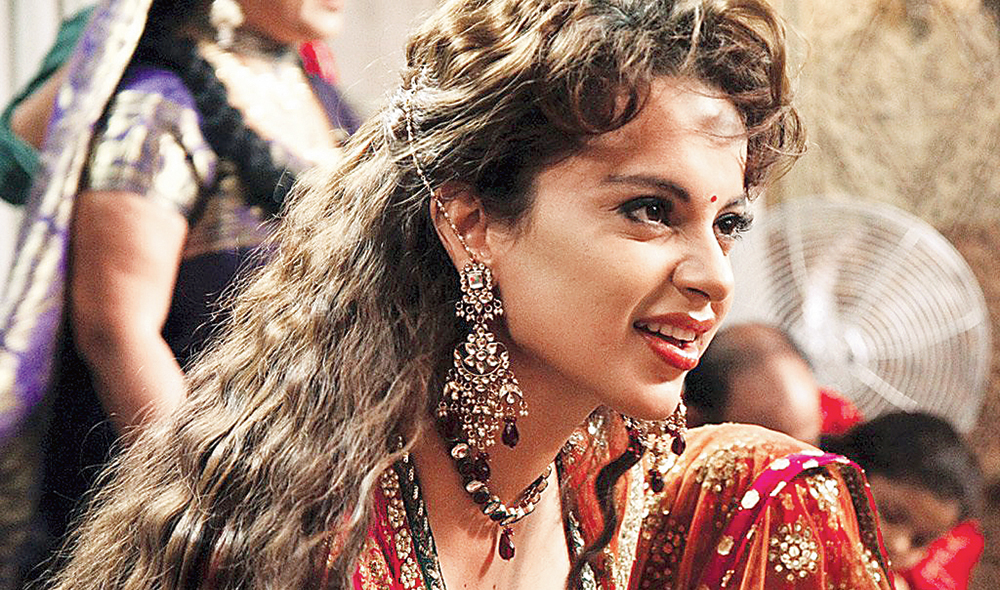
A scene from the movie Source: ‘Tanu Weds Manu’
2011: Tanu Weds Manu
Director: Aanand L. Rai
Like many films before and after, the middle-class north Indian milieu came alive in this Aanand L. Rai film that was powered by an uninhibited Kangana Ranaut. Tanu Weds Manu subverted the idea of the desi girl, showing Kangana’s Tanu as a drinking, smoking and frequently swearing rebel who oscillated between edgy and erratic… a fascinating paradox who catches the eye of the introverted Manu, played effectively by R. Madhavan.
Tanu Weds Manu makes it to this list because not only did it redefine gender roles both on screen and off — Kangana was the star pull, not Madhavan — but also showed what powerful writing (it was penned by Himanshu Sharma, who has written most of Rai’s films) could do to what was an essentially run-of-the-mill idea. Tanu Weds Manu did quirk right, without going overboard, and gave a fresh spin to cliches. Plus, Kangana was on fire!
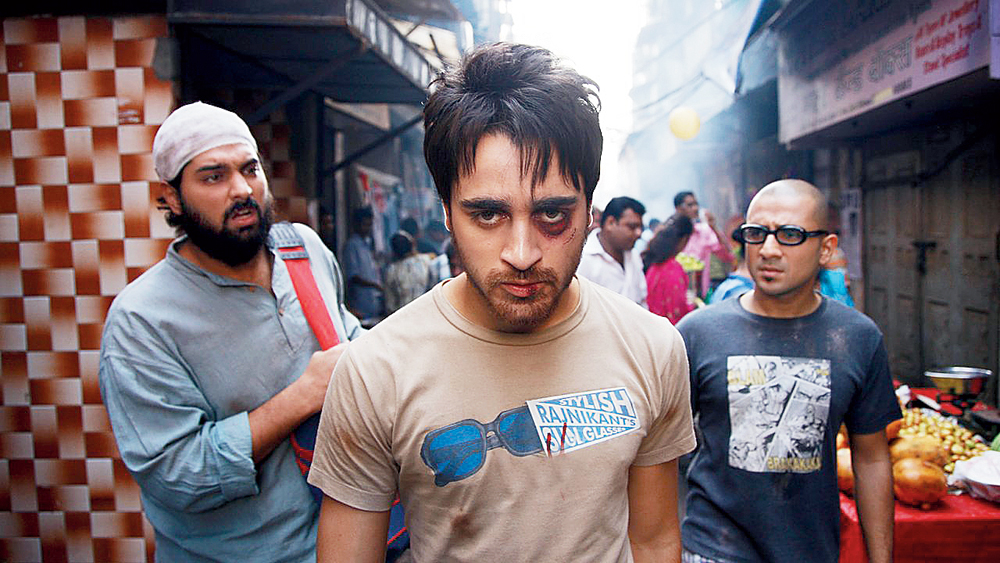
A scene from the movie Source: ‘Delhi Belly’
2011: Delhi Belly
Director: Abhinay Deo
“Jo chauka udte huye jaaye, usey chhakka kehte hain!” Delhi Belly lofted it over extra cover for a six, coming up with what is perhaps the most uninhibited and irreverent Bolly film this decade has seen.
Insanely funny, this dark comedy pushed all the right buttons, giving us a film that treated us like adults and made a lot of sense even when all that was playing out on screen was a chaotic mess. Refreshing in content — adult jokes to abuses flying about, and not just directed at DK Bose — Delhi Belly also scored a first with its format: 96 minutes playing out without an interval. It capped it off with producer Aamir Khan — nephew Imran was the film’s lead — stepping in to bring the house down with the quirky I hate you (like I love you).
Real and relatable and yet crazy enough to send you on a trip, writer Akshat Verma deserves all the applause for churning out an original. And yes, chances are you have never looked at orange juice the same way again.
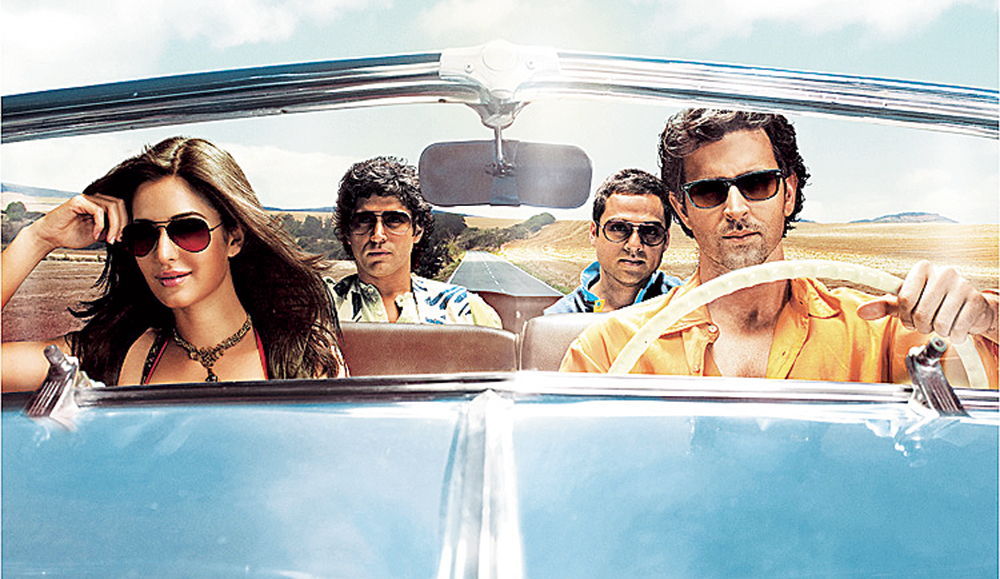
A scene from the movie Source: ‘Zindagi Na Milegi Dobara’
2011: Zindagi Na Milegi Dobara
Director: Zoya Akhtar
Everyone has a favourite mood and moment, dialogue and scene from Zindagi Na Milegi Dobara. That’s how impactful Zoya Akhtar’s second film continues to be, even eight years after it hit theatres.
Be alive to each moment was the core idea of this buddy film that traversed the sunny beaches and the sprawling countryside of Spain. ZNMD taught us to beat our fears, to make each minute count, hold on to those who matter and let go of that which hurts. Both cathartic and charming, the film was distinguished by many a raw cinematic moment — Arjun (Hrithik Roshan) and Laila (Katrina Kaif) conversing about life while lying under the stars still holds magic, while that Doordarshan scene in the bar is a classic. The film had many strengths — naturally felt performances to zingy humour (most centred around Bagwati), Shankar-Ehsaan-Loy’s winning score to the lines penned by Javed Akhtar. Some planned a trip to Spain after the film, while many others were content to just hear and hum the lines, ‘Jo apni aankhon mein hairaniyaan leke chal rahe ho, toh zinda ho tum/ Dilon mein tum apni betaabiyan leke chal rahe ho, toh zinda ho tum’.
Special mention: Rockstar
Raw, visceral, cathartic…. There are many ways to describe Imtiaz Ali’s most angry film, with Ranbir Kapoor churning out an act of a lifetime as a Jim Morrison-esque rocker complemented by A.R. Rahman’s powerful and poignant music. Rockstar had its share of problems, but as a film it gave us scenes — Ranbir as Jordan finding soul and solace in the dargah to letting it all out on stage — that will surely find their way to many a Bolly showreel. And even now, when Rahman goes Kun faya kun, there is little else that can top that.
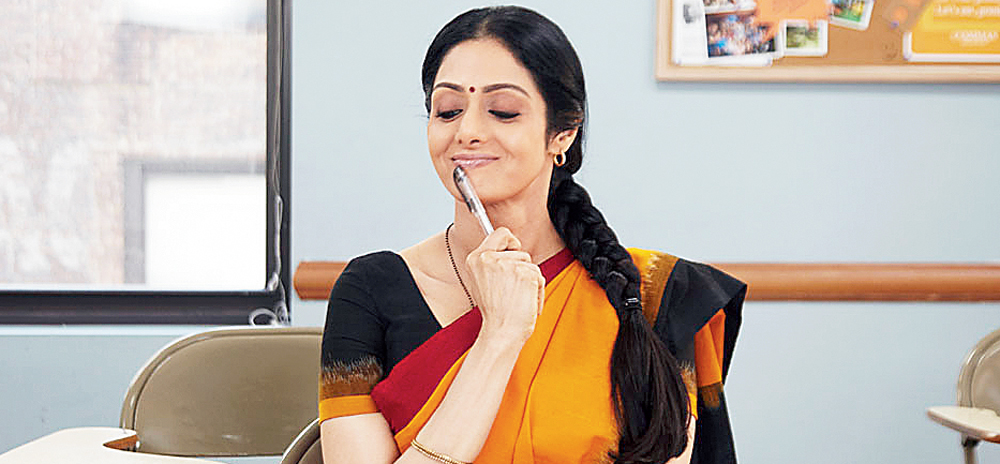
A scene from the movie Source: ‘English Vinglish’
2012: English Vinglish
Director: Gauri Shinde
“Her eyes are like two drops of coffee in a cloud of milk.” Coming out of a break, Sridevi proved her brilliance once again in this Gauri Shinde debut that spoke about dignity, self-respect and the need to break free.
An underdog story that didn’t pound in its message. English Vinglish was charming yet moving, giving us people and places, scenes and situations that were instantly relatable. Shinde — who has since also helmed the equally sensitive Dear Zindagi — gave a voice to every woman dismissed by friends and family.
English Vinglish scored with its subtlety and concentrated not on an overaching dramatic arc or a complicated narrative but on creating those special moments. Sridevi, of course, was the beating heart of the film, trading in her chiffon saris for cotton and winning us every time — from busting a familiar Michael Jackson move to her eyes lighting up when she was called an ‘entrepreneur’ to delivering that winner of a speech towards the end.
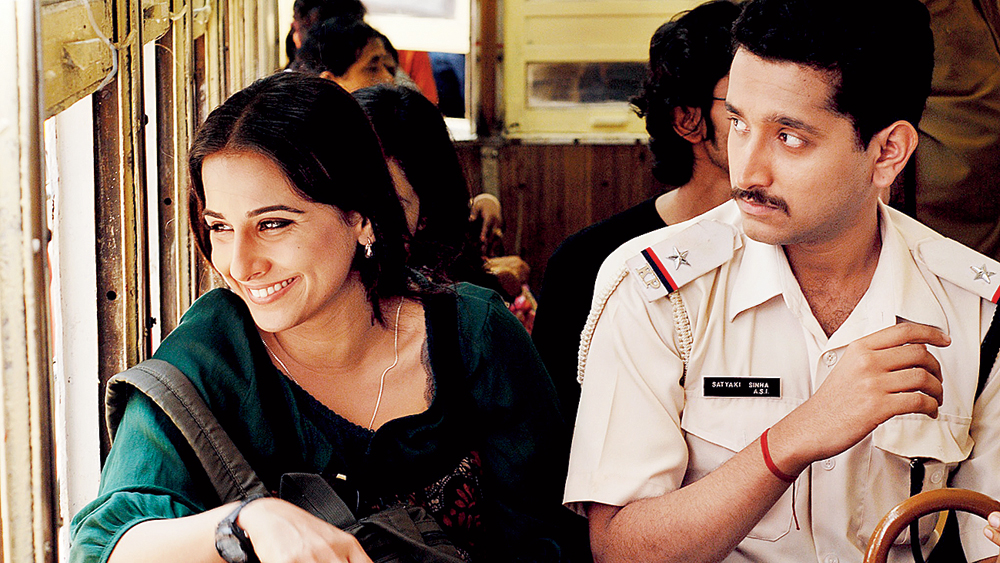
A scene from the movie Source: ‘Kahaani’
2012: Kahaani
Director: Sujoy Ghosh
Born out of the busy bylanes of a Calcutta we had rarely seen on screen before, Sujoy Ghosh crafted a deliciously edgy thriller that ticked off many boxes. Vidya Balan led from the front to play the ‘pregnant’ protagonist Bidya Baghi in a film that effectively meshed manipulation with masquerade.
Kahaani was a rare thriller that warranted more than one watch, with Sujoy shooting the city as a medley of breathtaking images and seductive sounds and the keeper of many a deep and dark secret. From the credible twists and turns that kept one engaged to the strong ensemble acts — Parambrata Chattopadhyay to Nawazuddin Siddiqui to Kharaj Mukherjee — Kahaani scored, and how, with Saswata Chatterjee’s smiling killer-for-hire Bob Biswas proving to be a game-changing turn. And it’s still magic every time you watch Vidya staring that final stare at her adversary before bringing her hairpin down on him. Goosebumps!
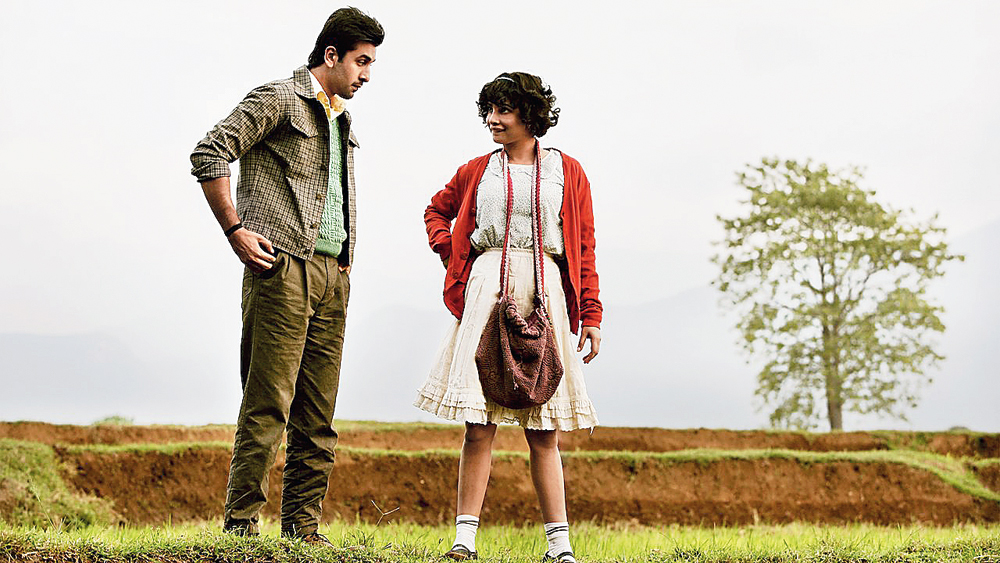
A scene from the movie Source: ‘Barfi!’
2012: Barfi!
Director: Anurag Basu
A film that felt like a giant, warm hug. Barfi! — with Ranbir’s act as the titular character shaking and stirring various emotions within us — was a delightful watch, giving us a rare Bolly film that kept the chuckles coming as frequently as the lump in the throat.
Basu fashioned a film that didn’t always score on plot and premise, but worked because of its magical moments, most involving Barfi and Jhilmil (Priyanka Chopra, in what we think was her best-ever turn), supported by Pritam’s soul-stirring music — Phir le aaya dil still gets us every time.
Barfi! established Basu as an avant-garde filmmaker, giving us a film that was practically very little story but a whole lot of storytelling. So many years on, so many images still stay on… Shruti (Ileana D’Cruz on debut) staring longingly at Barfi, Jhilmil holding on to Barfi’s shirt on that tram ride… pure magic.
Special mention: Gangs of Wasseypur
Anurag Kashyap’s pen gave birth to Ram Gopal Varma’s iconic gangster film Satya. So when it came to crafting the seminal Bolly gangster film, there was no way that Kashyap was going to pull any punches. Smartly filmed and packed with action, this revenge story — filmed in two parts and spanning over five hours — embodied a no-holds-barred derring-do, brought alive by gruesome violence and abusive language, with Kashyap drawing on his love for the greats — Sergio Leone to Quentin Tarantino, but rooting his sex and violence saga very firmly in the desi hinterland. Few are as brave as Kashyap when it comes to telling it as it is, and Gangs of Wasseypur — boasting stellar turns from Manoj Bajpayee and Nawazuddin Siddiqui — is ample proof of that.
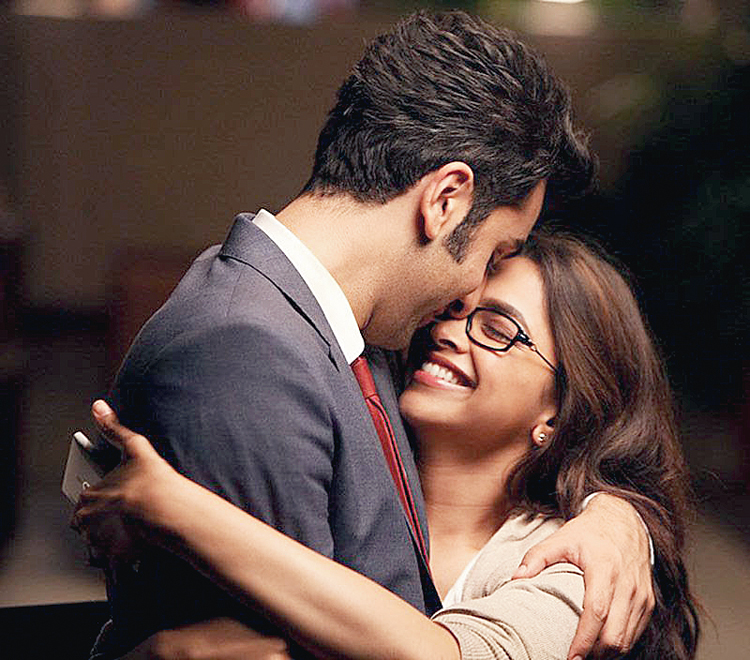
A scene from the movie Source: ‘Yeh Jawaani Hai Deewani’
2013: Yeh Jawaani Hai Deewani
Director: Ayan Mukerji
“Agar main tumhare saath do minute aur rahi toh mujhe tumse pyaar ho jayega… phir se… aur tumhein nahin hoga… phir se”.
Yeh Jawaani Hai Deewani became the clarion call for the inner awakening of an entire generation (“Aaja tujhko pukaare teri parchhaaiyan”), with its winning lines — including this one, made even more impactful by Deepika Padukone’s teary eyes — finding fans and being quoted even today. Ranbir Kapoor’s Bunny epitomised every young heart looking for more from life, with Ayan — who had scored earlier with Wake Up Sid — talking about everything from crushed dreams to lost love (“Tum galat nahin ho, bas mujhse bahut alag ho”), from waning friendships to complicated relationships.
Everything in Yeh Jawaani... struck a chord, its light-hearted conversational tone packing in lessons about living life in the moment and drawing up priorities. DP and RK effortlessly became Bunny and Naina, with Pritam’s music — Badtameez dil to Balam pichkari — still a playlist staple.
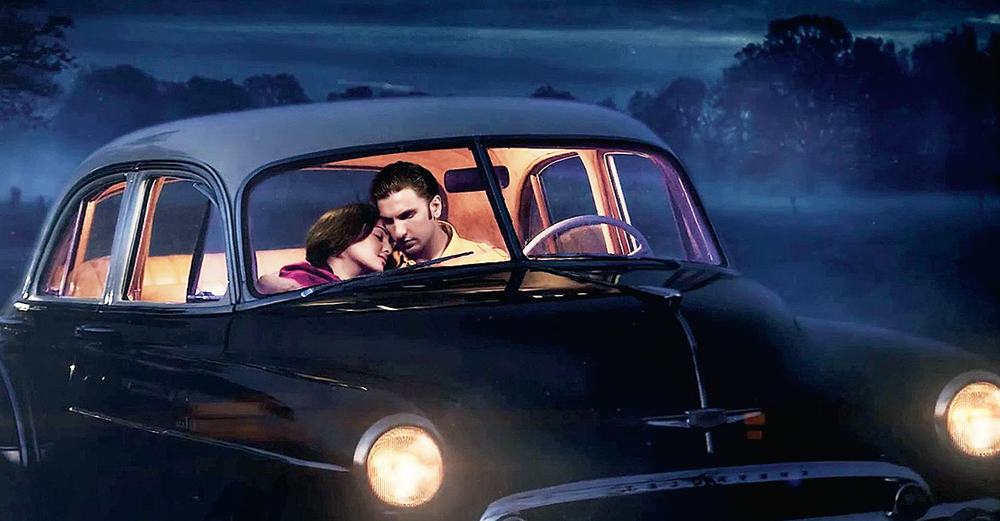
A scene from the movie Source: ‘Lootera’
2013: Lootera
Director: Vikramaditya Motwane
Three years after Udaan, Motwane took a leaf out of O. Henry’s collection of short stories to adapt his The Last Leaf for the desi screen. Lootera, flitting from the ruralscape of Bengal to snowy Dalhousie, was poetry in motion. Viscerally enchanting and deeply evocative, the film relied more on its silences and stares, with Motwane scoring with his visually moving storytelling in depicting this achingly beautiful story of doomed love.
Sonakshi Sinha’s eyes were reason enough to watch the film, and Lootera gave us an all-new Ranveer — quiet and restrained and silently fighting his demons. What made Lootera an even more fulfilling experience? Amit Trivedi’s soul stirrers — Manmarziyaan to Zinda, Sawaar loon to Shikaayatein.
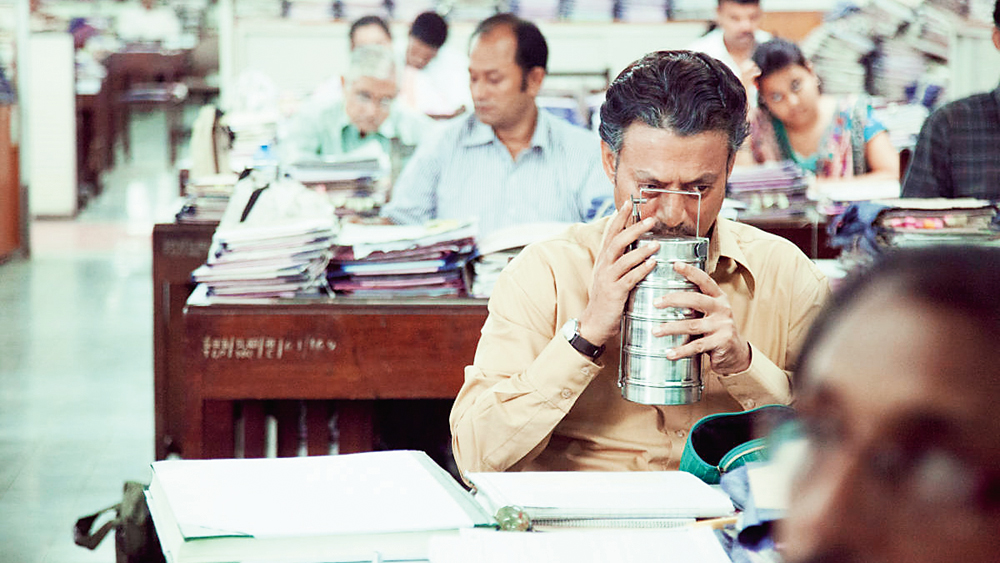
A scene from the movie Source: ‘The Lunchbox’
2013: The Lunchbox
Director: Ritesh Batra
One may argue that this is technically not a Bolly film, but given that it’s peopled by desi actors and helmed by an Indian filmmaker, there is no reason why The Lunchbox shouldn’t make it to this list. The unconventional love story of two lonely souls — built bit by bit by the chits of paper they share in a dabba — was the charming, slightly old-world premise of this Ritesh Batra debut. But in an age of social media and smartphones, The Lunchbox found its audience, with the unspoken romance between Saajan (Irrfan Khan) and Ila (Nimrat Kaur) proving to be much-needed succour for the soul. Batra skilfully used the chaos of Bombay to craft a story of loneliness that won us over with its innocence and simplicity, trekking terrain as diverse as Cannes and Bafta.
Special mention: Shahid
Hansal Mehta has always been a voice of originality and dissent and the man walked the talk with this real-life story of a military operative who becomes a criminal lawyer and meets a gruesome end. Gritty, gutsy, bold and brave, Shahid conveyed angst without being an angry film. It was powered by a strong central act from Rajkummar Rao, and won him a National Award.

A scene from the movie Source: ‘Queen’
2014: Queen
Director: Vikas Bahl
The film that changed it all for Kangana Ranaut was the story of a young woman ditched at the altar who shakes off self-pity and instead channels her misery to discover the world and find her own corner in it.
Queen became the story of every woman, a cathartic journey of self-discovery, with Kangana delivering an act both strong and vulnerable. What worked for the film was its lightness of touch, with even heartbreak being told through humour.
Sisterhood to selfless friendship, this was a film that said it all without hammering in its message, allowing the audience to accompany Kangana’s Rani, step by step, on her life-changing journey. It earned Kangana a National Award and in Rani, gave us a heroine we related to and were inspired by.
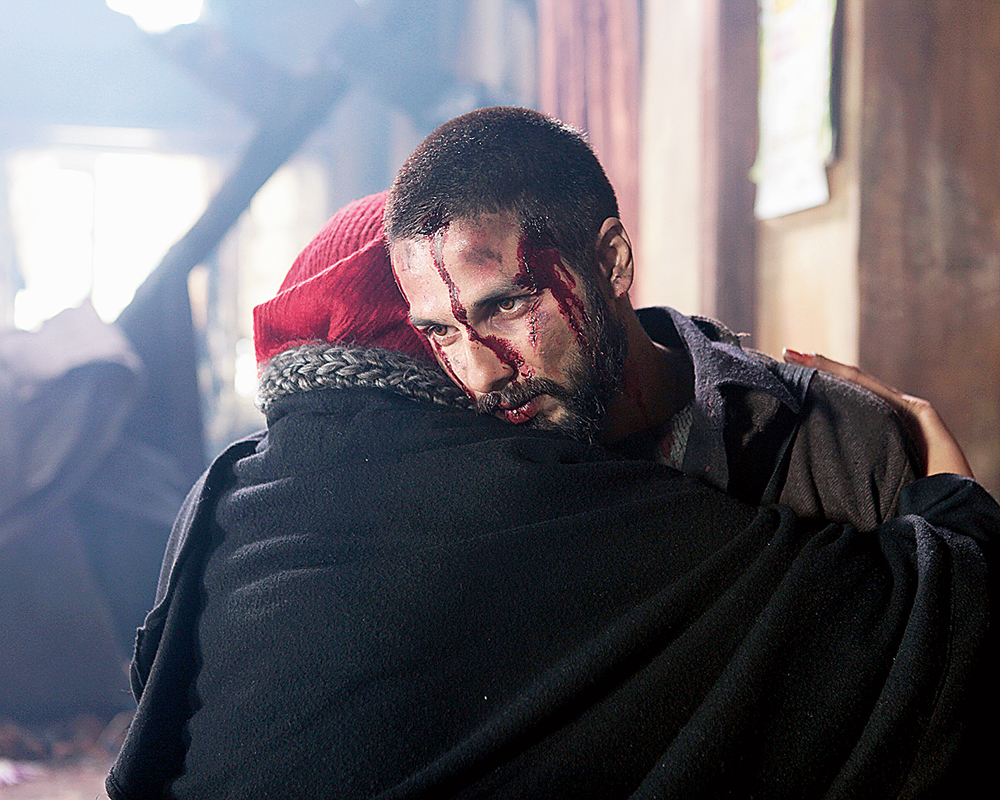
A scene from the movie Source: ‘Haider’
2014: Haider
Director: Vishal Bhardwaj
After Maqbool (Macbeth) and Omkara (Othello), Vishal Bhardwaj concluded his Shakespeare trilogy with Haider, the retelling of Hamlet, in what is easily the director’s most political film.
Haider scored in terms of both content and form, employing a sweeping, operatic approach to cast a brave and unflinching eye on insurgency in Kashmir. He balanced the heaviness of his plot with patches of dark humour (Salman and Salman were a hoot) and teamed up with long-time collaborators Tabu, Shahid Kapoor and Irrfan Khan to deliver a film both powerful and poetic.
A rocking score, loaded lyrics, colourful choreography and brilliantly staged monologues made Haider a story of a conflicted and misguided young man and not a hero in a film that cocked a snook at market conventions. Every department — writing to acting, music to cinematography — excelled, with those final frames... blood spilling drop by drop on the snowy white plains... being one of the most evocative in recent Bolly memory.
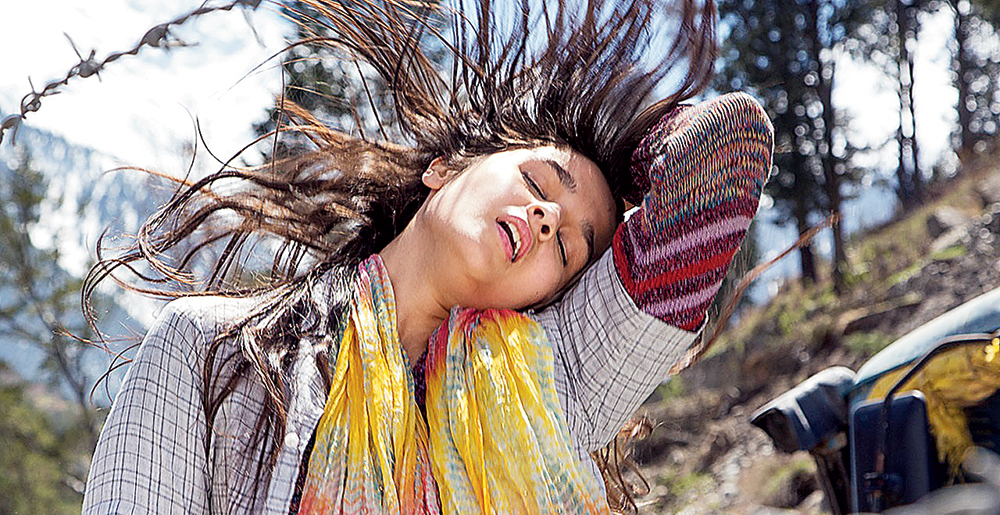
A scene from the movie Source: ‘Highway’
2014: Highway
Director: Imtiaz Ali
Highway wasn’t Imtiaz Ali’s best film, but its imperfections is what made it real and relatable. In telling the story of a rich girl — sheltered almost to the point of claustrophobia — who discovers the world and breaks free only when she is kidnapped, the filmmaker touched upon themes of child abuse and Stockholm Syndrome, but added his own lyrical quality to it.
Alia Bhatt threw a curveball at the audience in her second film, making Highway’s journey so charming that you simply soaked in its magic. Wherever the film faltered, A.R. Rahman’s magic — Maahi ve to Patakha guddi — took over.
Special mention: Ankhon Dekhi
This was a charming slice-of-life film centred on a quinquagenarian (Bauji, brought to life by a top-notch Sanjay Mishra) who only believes what he sees with his own eyes.
On the surface, Ankhon Dekhi was a part serious-part hilarious account of a man at odds with the world, but it scored as a parable on human nature, with Kapoor tempering whimsy with earthy. Ankhon Dekhi was that rare film that asked questions without intending to make a statement.
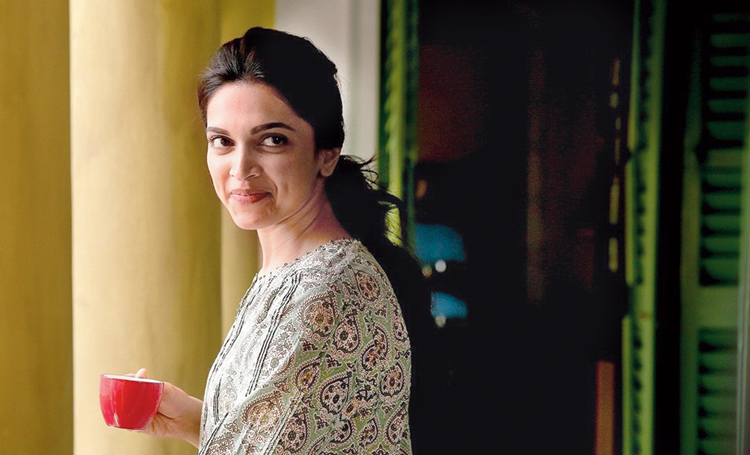
A scene from the movie Source: ‘Piku’
2015: Piku
Director: Shoojit Sircar
Who would have thought that a film built around a 70-year-old man’s bowel habits would find the mainstream audience it did and become one of the best films of the decade?
Shoojit Sircar, armed with a quirky script penned by Juhi Chaturvedi, delivered a slice-of-life, bittersweet tale about the idiosyncrasies of a father-daughter relationship. Piku — powered by a knockout act from Deepika Padukone, with Amitabh Bachchan and Irrfan Khan doing what they do best — made us revisit our own relationships with our ageing parents, with Shoojit striking the perfect balance between moments both hilarious and heartwarming.
Relationship to road trip to (unconventional) romance, Piku packed in all without breaking into a sweat, its distinctly Bengali look and feel — quirks and warts — bringing on the laughs. Its magic lay in its moments — Bachchan’s Bhaskor Banerji jigging to Ke tumi Nandini, the laugh-out-loud dining table conversation about constipation or the final moments when Bhaskor passes away and Piku picks up the threads of her life, a smile on her face and a badminton racquet in hand.
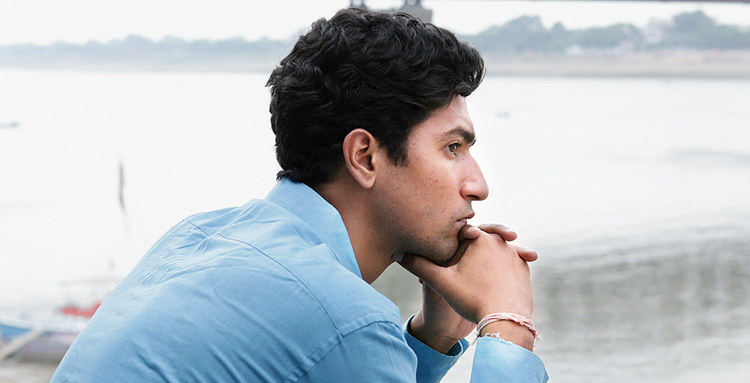
A scene from the movie Source: ‘Masaan’
2015: Masaan
Director: Neeraj Ghaywan
Ghaywan turned in a haunting and riveting debut with his double Cannes winner, teaming up with writer Varun Grover to construct a moving tale of broken and bruised lives. The city of Varanasi lent tone and texture to Masaan, with Ghaywan touching upon everything, from a woman wronged to a boy being marginalised because of caste, and how their thoughts, actions and reactions determine their immediate environment. The film may largely have been about young India bucking sexual, moral and caste traditions, but it was also a poignant look at grief and dripped with pain and poetry in equal measure. The film stood out for drawing its references from Hindu and Urdu poetry, with Dushyant Kumar’s visually evocative poem, Tu kisi rail si guzarti hai/Main pul sa thartharata hoon, making Masaan richer.
What stayed on was that moment of unbridled and uninhibited bereavement that Deepak brought palpably to the screen. Vicky Kaushal the actor was born with this one.
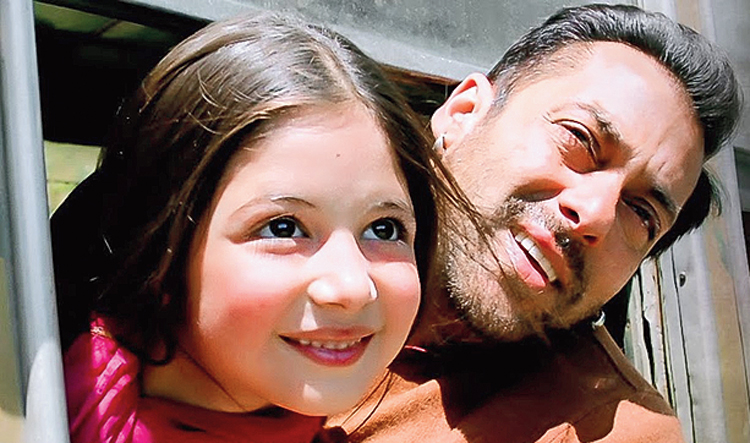
A scene from the movie Source: ‘Bajrangi Bhaijaan’
2015: Bajrangi Bhaijaan
Director: Kabir Khan
Kabir Khan stripped Salman Khan of his superstar aura to give us a do-gooder Everyman with a heart of gold. Bajrangi Bhaijaan — a large part of its triumph lay in its title — made a cause for the need for subcontinental peace by fashioning a cross-border drama that saw Salman’s simpleton Bajrangi pulling out all the stops to reunite six-year-old Munni (a cute Harshaali Malhotra) with her parents in Pakistan.
Essentially an emotional tale that pushed the buttons of humour and heart, feel-good and family, Bajrangi Bhaijaan scored because of its political overtones, with Kabir making sure that his film genuinely moved the viewer even when we knew that we were being manipulated. Salman made his Bajrangi endearingly naive and sweetly vulnerable, with Nawazuddin Siddiqui giving the film its wings. Even today, Bajrangi Bhaijaan remains a film we watch on repeat, laughing through Bajrangi and Munni’s ha-ha escapades and tearing up in its deeply moving climax, an ending even more distinctly utopian today.
Special mention: Dum Laga Ke Haisha
Rare moments of lost innocence formed the foundation of this Sharat Katariya film that evoked ’90s nostalgia — audio cassettes to Bajaj scooters — to come up with a tale of a mismatched couple working through their complexes and the complexities in their relationship to give us an uplifting romance that felt so real.
Dum Laga Ke Haisha rode high both on strength and vulnerability, doing away with the cliches of a Bolly rom com and crackling with some slice-of-life humour (“Limca pee lo, gas theek ho jayega,” was so-so-relatable).
Ayushmann Khurrana, in what was the beginning of his dream run that continues till now, got his flawed hero down pat with debutante Bhumi Pednekar doing away with vanity to pile on the kilos in her portrayal of an overweight woman brimming with confidence. The soulful Moh moh ke dhaage — Papon and Monali Thakur at their best, with Varun Grover striking gold with his words — took care of the rest.
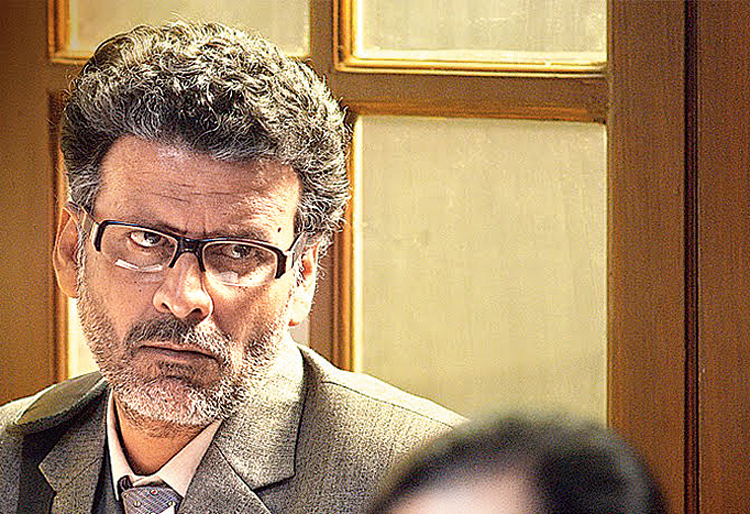
A scene from the movie Source: ‘Aligarh’
2016: Aligarh
Director: Hansal Mehta
Manoj Bajpayee’s sterling performance — soulful, stirring, searing — was at the heart of this Hansal Mehta gem that spoke about dignity and self-respect, focusing on the physical and mental torture that Professor Siras, a real-life professor of Aligarh Muslim University hounded for his sexual orientation, faced in an India still queasy about homosexuality. Penned by Apurva Asrani, it was both timely and telling, doing away with the stereotypes that Bollywood is largely guilty of in portraying gay characters. Aligarh spoke more through its silences — mostly courtesy a brilliant Bajpayee — giving us a film that held up a mirror to society and also called for deep introspection. It stressed on the need to not label and the right to privacy, touching upon loneliness and consent. Rajkummar Rao lent able support, but it was Bajpayee, portraying Siras as a man fighting for his identity but never apologetic about it, who made Aligarh the film it is. That shot of him quietly sitting in the dark, nursing a drink and staring into nothingness as the strains of Aap ki nazron ne samjha wafted in, was nothing short of pure movie magic.
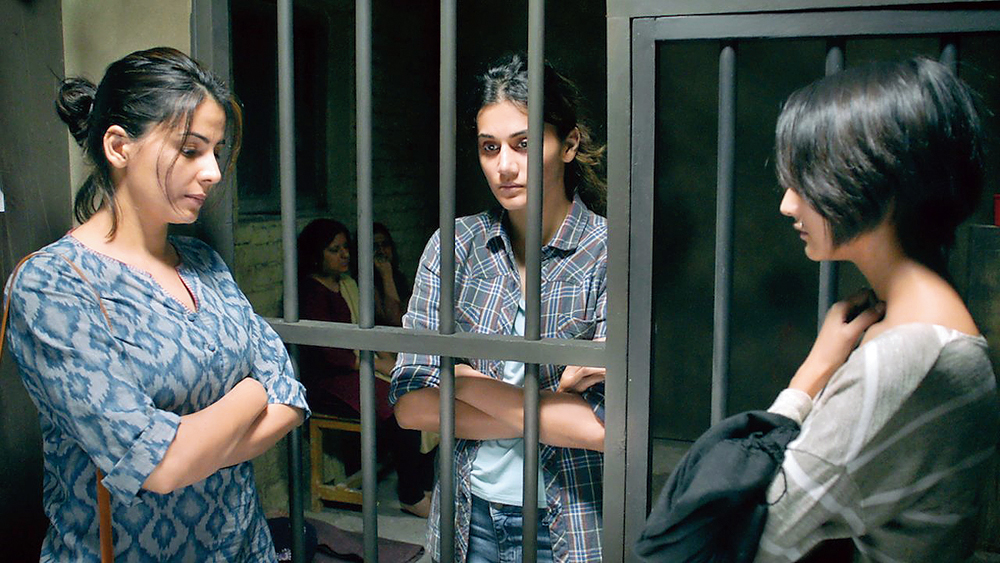
A scene from the movie Source: ‘Pink’
2016: Pink
Director: Aniruddha Roychowdhury
The feeling of being helpless even at your strongest... because you are a woman. That’s the horror that Pink brought out into the open with Tolly man Aniruddha Roychowdhury hitting hard with his Bolly debut, articulating a woman’s right to consent. Delhi may have been the setting of this film that uncovered many uncomfortable truths, but it told the story of every woman in India striving for pride and fighting against prejudice. We watched Minal, Falak and Andrea going through trying times — their lives and reputations on the line — with Pink being a film that empowered us as much as it made us feel helpless.
With Shoojit Sircar as creative producer and powered by some robust acts — Taapsee Pannu shot to the spotlight with this one — Pink spoke succinctly about how a woman who walks into a room with a man is considered easy; a woman who laughs and touches a man while talking is easy; a woman who stays out late at night is easy; a woman who lives alone is easy; a woman who drinks with a man is easy; a woman who cracks a sex joke is easy; a woman who has sex is easy… and how being a woman in this country isn’t easy.
It may have been guilty of mansplaining in parts — courtesy Amitabh Bachchan’s uneven lawyer act — but Pink is the film that taught us the importance of ‘No means no’.
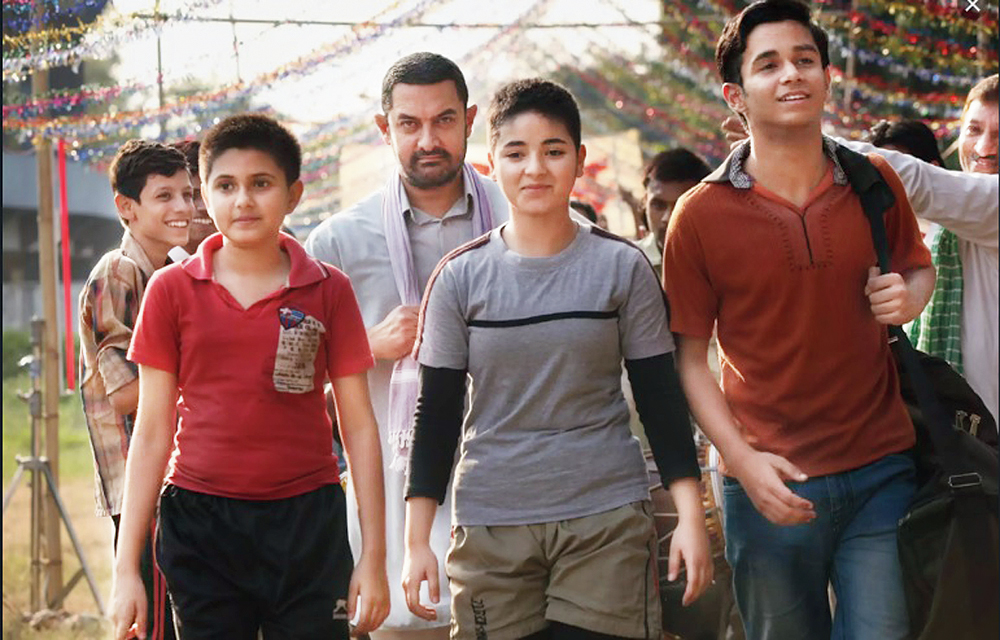
A scene from the movie Source: ‘Dangal’
2016: Dangal
Director: Nitesh Tiwari
Aamir Khan put might, money and muscle behind this Nitesh Tiwari film — the real-life story of wrestler Mahavir Phogat and his daughters — that worked on various levels… an inspiring sports movie that employed all the tropes of the genre to deliver a rousing experience and one that made a strong feminist statement about women being as good in an arena — in this case, wrestling — as men.
Doing perhaps what no other superstar is capable of, Aamir piled on the kilos and receded into the background, allowing its young debutantes — first Zaira Wasim and Suhani Bhatnagar and then Fatima Sana Shaikh and Sanya Malhotra — to drive the film, even as he stepped in to power Dangal’s key moments.
It whipped patriarchy to pulp and taught us to value our daughters, but never stopped being an entertaining watch. The film scored big on authenticity, with both emotion and sport being played out without artifice. It rose above its flaws — the unabashed milking of patriotism stood out like a sore thumb — to craft a stimulating underdog story that made our hearts soar even as it teased our tear ducts.
Special mention: Kapoor & Sons
The dysfunctional desi family was at the core of Shakun Batra’s deeply moving and often delightful sophomore outing. A real film about real people battling real issues and engaging in real conversations, Kapoor & Sons looked at flawed filial ties and excelled in stitching together some organic moments — the plumber scene is easily one of the classics of the decade.
The film was as effective when it took a step back to let the story unfold at its own pace as it was in its final manic moments when everyone’s deep, dark secrets started spilling out. It’s a rare Bolly outing that showed us that a film could be powerful without being overtly dramatic, with the stellar acts at the centre — Rishi Kapoor, Ratna Pathak Shah, Rajat Kapoor and Fawad Khan were the pick of the lot — powering it even when it faltered.
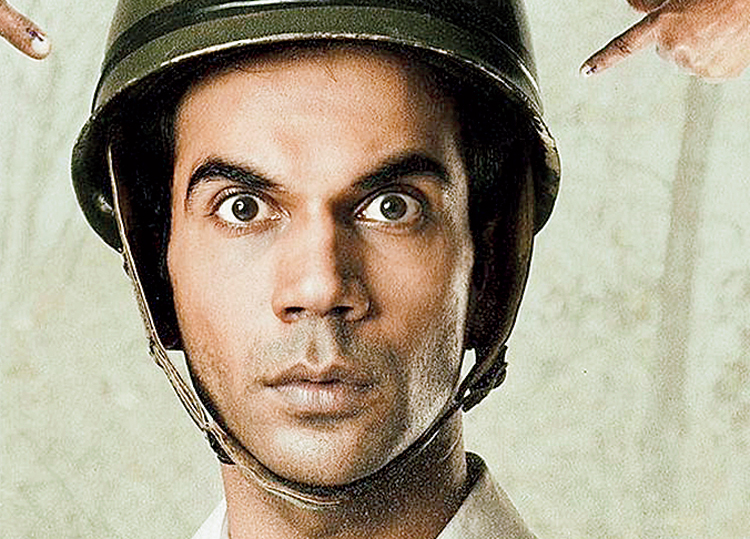
A poster of the movie Source: ‘Newton’
2017: Newton
Director: Amit V. Masurkar
India’s entry to the Oscars that year had Rajkummar Rao and Pankaj Tripathi — counted among the best actors in Indian cinema today — facing off on opposite sides of the divide between idealism and cynicism.
Newton, with Rajkummar excelling in the title role, seemed to be a simple and straightforward story about the shortcomings in the way our democracy votes its choices to power, but its greatest triumph lay in how it tackled prickly issues in an even-toned manner.
It took gentle jibes at India’s electoral system, bureaucracy and its law-and-order machinery, but never brushed anything under the carpet, making it a film that had the guts to tell it how it felt it. In an era where jingoism has slowly but surely taken over from patriotism, Newton never pressed for a revolution, stressing only on the need for a resolution.
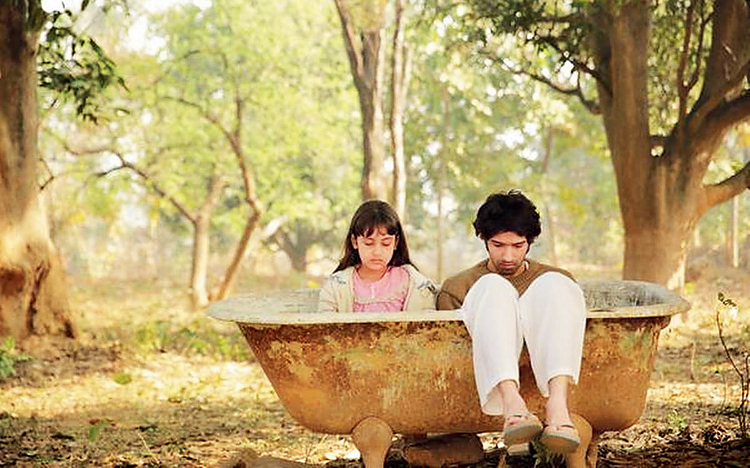
A scene from the movie Source: ‘A Death in the Gunj’
2017: A Death in The Gunj
Director: Konkona Sensharma
Konkona’s directorial debut is a sharp, sensitive and soulful film, a slow-burn watch that skilfully brought out the insecurities and egos, complexities and tensions of a family on the boil.
A keenly observed drama that benefited from its unhurried pace, A Death in the Gunj — playing out in 1970s McCluskieganj — had a winner ensemble of actors, but it was clearly Shutu’s story, with Vikrant Massey inhabiting his deeply troubled character effortlessly. Rich in atmospherics, the film tempered its unsettling and brooding frame with patches of dry humour, with the moodboard being both mellow and melancholic. Its explosive climax is perhaps the most effective — and stunning — we have seen in recent times.
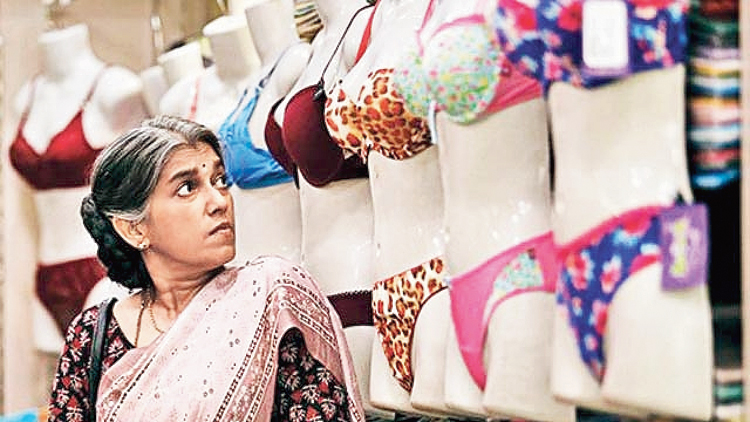
A scene from the movie Source: ‘Lipstick Under My Burkha’
2017: Lipstick Under My Burkha
Director: Alankrita Shrivastava
A woman’s needs, wants and desires found focus in this Alankrita Shrivastava film that waged an unending battle against the censor board to fashion a feminist film that didn’t have to unreasonably and unnecessarily froth at the mouth to put across its point.
“Our problem is that we dare to dream.” That was what defined this honest and gritty look at what it means to be a woman in small-town India, where rapid modernisation has given rise to an inversely proportional narrowing of mindsets.
It tempered its thorny story with generous doses of pathos and humour, its four spunky women — there was very little to choose between Ratna Pathak Shah, Konkona Sensharma, Aahana Kumra and Plabita Borthakur — being both inspirational and relatable. Shrivastava’s #win lay in navigating through the tricky terrain of female desire, the sexual needs of older women and religious conservatism, without resorting to titillation or sensationalism.
Special mention: Mukti Bhawan
Its central premise was death and yet Mukti Bhawan — its young director Shubhashish Bhutiani had described it as “a smile film about death” to The Telegraph — managed to draw a chuckle and sometimes even a loud laugh.
Gently comic even when dealing with the morbid, Mukti Bhawan was also a father-son story with Lalit Bahl and Adil Hussain bringing a familiar, lived-in feel to their parts. A film blessed with staggering depth, Mukti Bhawan worked because of the lightness of touch it employed to undercut potentially heavy moments. It also found beauty in the banal and was a poignant and uplifting film that both celebrated life and meditated on death.
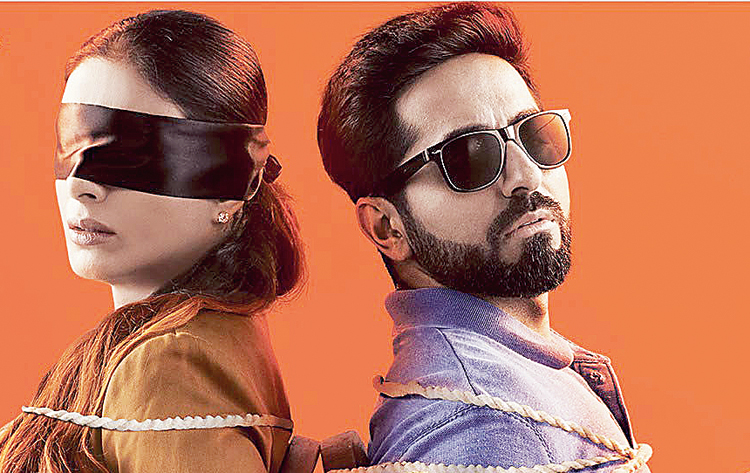
A poster of the movie Source: ‘Andhadhun’
2018: Andhadhun
Director: Sriram Raghavan
He’s been the master of thrillers and Sriram Raghavan served up an as-good-as-it-gets ‘howdunit’ with this film that ticked all the boxes associated with the genre, and then some more.
Keeping the viewer guessing at every point even after revealing the murderer and motive, Andhadhun functioned as much as a commentary on human flaws as it did as a fast-paced action thriller. The twisty turns in the plot apart, it was the wry wit that kept the film ticking, with this tale of crime and misdemeanour scoring with moments of silence succeeded by bursts of violence and in imbuing the innocuous with the sinister.
Spilling with motifs and casting a keen eye on the human mind and its machinations, it’s the performances — Ayushmann Khurrana to Radhika Apte, with Tabu (yet again) being the pivot — that powered the film. Its ambiguous ending (“Was he blind or wasn’t he?”) intrigues the consummate thriller buff even today.
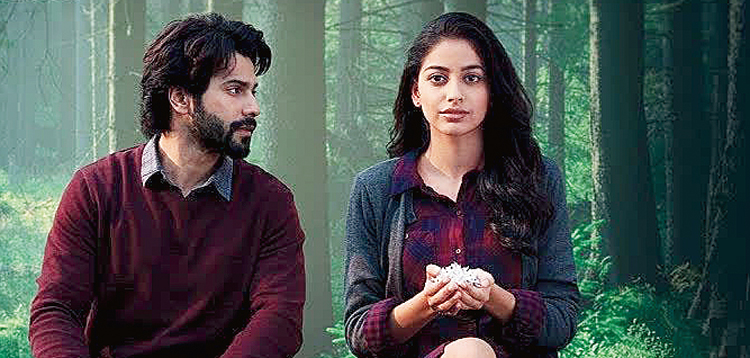
A scene from the movie Source: ‘October’
2018: October
Director: Shoojit Sircar
Beautiful and fragile, October can easily be counted as Shoojit Sircar’s bravest film. It spoke about empathy and grief, explored love in an unconventional dimension and touched upon life and loss, maturity and mortality in a way few Bolly films have done before or since.
Chronicling situations both brutal and believable, October — featuring Varun Dhawan in an against-type turn and sensitively penned by Juhi Chaturvedi — was a slow-burn watch. It milked the mundane — no crescendo, no big twist, no climactic background score — and yet managed to engage.
A film so sombre can unsettle and depress, but October culled its humour from the everyday and taught us that real power lay in not being judgmental or critical. It’s a film that demanded patience but rewarded the viewer for it in ample measure, its ending holding out hope even in heartbreak.
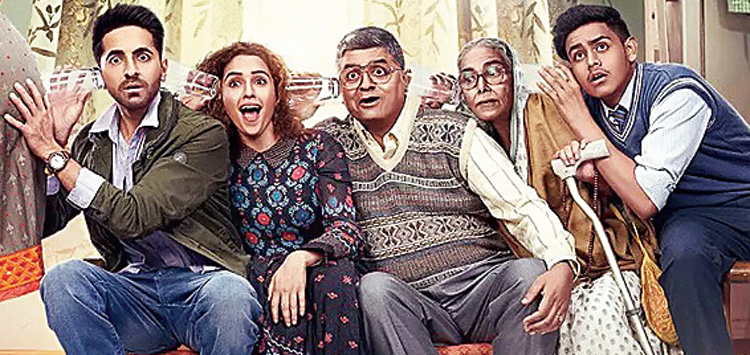
A scene from the movie Source: ‘Badhaai Ho’
2018: Badhaai Ho
Director: Amit Ravindernath Sharma
A situational comedy focusing on a so-called taboo, Badhaai Ho showed how to effectively use the medium of mirth to put across a strong message. The film had its younger leads in the form of Ayushmann Khurrana and Sanya Malhotra, but it was the older couple — played by Neena Gupta and Gajraj Rao — that much of the action and emotion was centred on. A slice-of-life comedy that diced thin several stereotypes, Badhaai Ho used its central premise of a 50-plus pregnant couple to draw most of its laughs and also pack in its lessons.
Real and rooted, Badhaai Ho effortlessly managed to tread the fine line between casting a critical eye on society and its double standards, all the while tickling your funny bone.
Special mention: Mulk
Armed with a distinct voice, filmmaker Anubhav Sinha crafted a courageous and compelling drama that tackled everything from communal hatred to the repercussions of Islamophobia. Mulk unfolded in the form of a gritty and gripping courtroom drama, the thrust and parry between Taapsee Pannu and Ashutosh Rana keeping the interest alive. It was a strong, central performance from Rishi Kapoor that motorised this fearless film about the “us vs them” divide and called out the divisive nature of Indian politics.

A scene from the movie Source: ‘Article 15’
2019: Article 15
Director: Anubhav Sinha
A year after Mulk, Anubhav Sinha trained his eye on class divide and caste-based politics — a lot more searingly this time — with this no-holds-barred film that made for an uncomfortable watch that you somehow couldn’t tear your eyes away from.
Fashioned as a gripping police procedural, Article 15 — with Ayushmann Khurrana leading from the front — dug far deeper to examine the underbelly of caste discrimination in the Indian heartland. The film, that told it the way it is, worked both as a cautionary tale and an urgent call to action, with Sinha drawing from real-life instances — Badaun gangrape to Una floggings — to highlight our superficial understanding of caste and its ramifications, coming as we do from a background of privilege.
Article 15 pulled no punches and hit where it hurts, the words of a key character, “We don’t need a hero. We just need people who need to stop waiting for a hero”, hitting home the strongest.
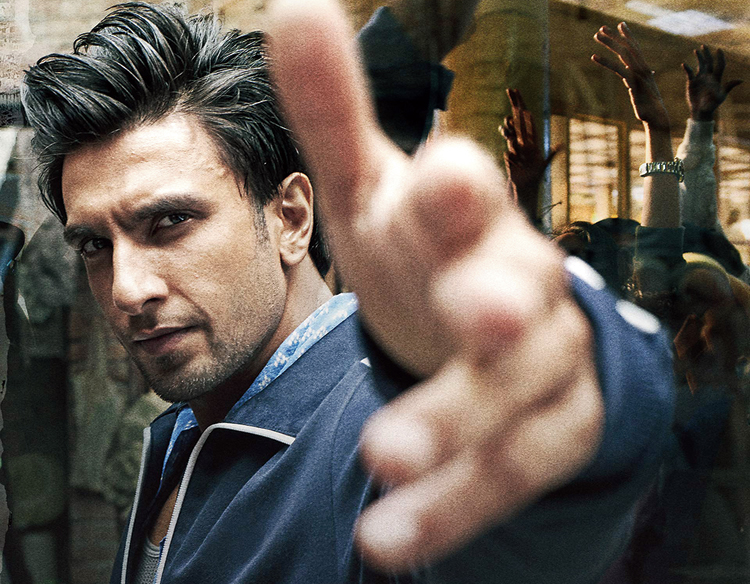
A poster of the movie Source: ‘Gully Boy’
2019: Gully Boy
Director: Zoya Akhtar
A rebel anthem that brought the marginalised to the mainstream and rarely missed a beat, Zoya Akhtar’s film was both a triumph of the human spirit and a #win in terms of storytelling.
The constant need to break free, the urge to rise above one’s reality and the ambition to make one’s place in the world was the bedrock of this honest film that brought the country’s underground rap scene to the forefront.
Gully Boy worked as a tribute to the underground music scene, a comment on class conflict and socio-economic disparity, a coming-of-age tale and an underdog story, but scored most with its political and socio-cultural overtones. Ranveer Singh brought alive “the voice of the streets”, with a spunky Alia Bhatt working as a perfect foil. Vijay Varma and debutant Siddhant Chaturvedi gave the film its layers, while its power came from its music, the film’s endeavour of “Asli hip-hop se milaaye Hindustan ko” giving rise to anthems like Azadi, Apna time aayega and Meri gully mein. What hit ‘bohot hard’? Gully Boy stressing and re-stressing, “Main kuch hoon aur meri koi aukaat hai”.
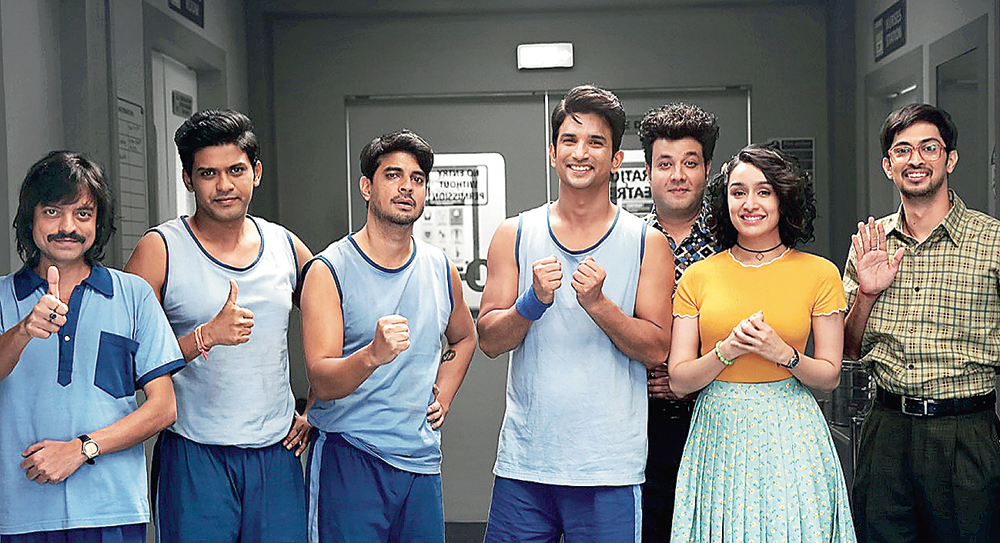
A scene from the movie Source: ‘Chhichhore’
2019: Chhichhore
Director: Nitesh Tiwari
A part heartful-part hilarious homage to “the best days of our lives”, Chhichhore was an engaging film about friendship and failure. It gently took us back to our growing-up days and coming-of-age years, crafting a nostalgic ride that warranted much more than just a one-time watch. Seamlessly oscillating between past and present, Chhichhore worked because it told us not how to celebrate success, but how to handle failure, without making things heavy. We teared up through the struggles of the chhichhores and belly-laughed our way through their escapades, the film triggering a flood of memories in anyone who has lived life on campus. Tiwari triumphed in making the conversations authentic, the milieu believable and winningly mined the wonder years for humour, emotion and life lessons.
Special mention: Bala
In a year that witnessed Bollywood’s obsession with baldness, it was, of course, left to Ayushmann Khurrana to spearhead a quirky and heartwarming tale on the downsides of being follicly challenged.
Bala, with Ayushmann in the title character, was largely a fun watch, but Stree man Amar Kaushik made it much more by touching upon how our idea of self-worth is wrongly linked to our appearance. We-too insecurities — selfies to social media, dark skin to language barrier — ensured that Bala found its audience, its crackling dialogues and charming ensemble saving matters even when it got a little sticky (case in point: face-painting Bhumi Pednekar to play a dark-skinned woman).

